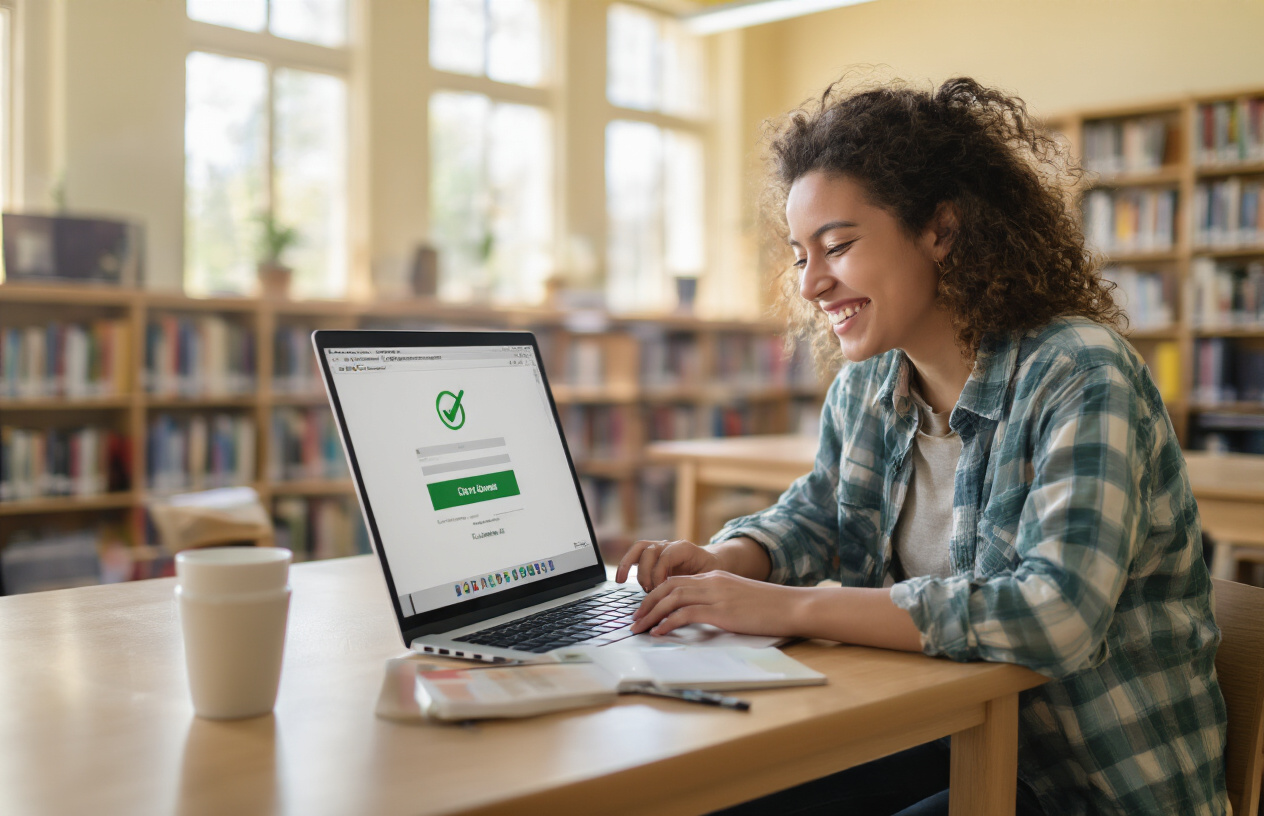
Ever stared at the Ohlone Canvas login page, watching that loading circle spin for what feels like eternity? Been there. Nothing quite kills your motivation for online learning like technical issues when you’re just trying to submit that assignment due at midnight.
Let’s fix that. This guide will walk you through everything from basic Ohlone Canvas login steps to troubleshooting those frustrating access errors that make you want to throw your laptop out the window.
Whether you’re a first-semester freshman confused about where to find your course materials or a returning student who suddenly can’t access your Ohlone Canvas account, we’ve got solutions that actually work.
But here’s what most guides won’t tell you about Canvas login issues…
Getting Started with Ohlone Canvas in 2025
What is Canvas and why Ohlone uses it
Canvas is that magic digital classroom where all your coursework happens. Think of it as your academic hub at Ohlone College – the place where professors post assignments, you submit homework, join discussions, and check your grades.
Ohlone College picked Canvas because it’s super reliable and incredibly user-friendly. Gone are the days of paper handouts and missed announcements. Now everything’s in one spot, accessible 24/7.
The college made the switch back in 2019, and they’ve been improving it ever since. In 2025, they’ve added even more features to make your student life easier.
System requirements for optimal performance
Your Canvas experience will only be as good as your tech setup. Here’s what you need:
For computers:
- Any modern browser (Chrome, Firefox, Safari, or Edge)
- At least 4GB RAM
- High-speed internet connection
For mobile:
- iOS 14+ or Android 10+
- Canvas Student app (free download)
Pro tip: Canvas runs sluggish on outdated browsers, so keep yours updated! If your computer’s from the stone age (before 2015), you might face some performance issues with video lectures and interactive content.

Creating your account credentials
Setting up your Canvas account is painfully simple:
- Check your Ohlone email for your initial login info
- Visit ohlone.instructure.com
- Enter your Ohlone ID number as your username
- Use the temporary password from your email
- Create a new password (at least 8 characters with numbers and special characters)
Your Canvas login is separate from your Ohlone portal login, so keep track of both!
Accessing Canvas from different devices
Canvas is literally everywhere you need it to be:
On your computer: Just head to ohlone.instructure.com in any browser. Bookmark it – you’ll visit daily.
On your phone/tablet: Download the Canvas Student app. It’s actually better than the browser version for quick checks and assignment submissions on the go.
No internet? The mobile app has limited offline features so you can still review course materials when you’re stuck without Wi-Fi.
The mobile experience has improved dramatically in 2025, with better notification management and a cleaner interface. Many students actually prefer it now for everything except writing long papers.
If you’re new to Ohlone Canvas or facing login problems, you’re not alone. Just like in our Palomar Canvas Login Guide, students often struggle with the same issues. That’s why we’ve created this updated 2025 guide—to help you get started quickly and confidently.
Step-by-Step Ohlone Canvas Login Process
A. Finding the official Ohlone Canvas login page
Getting to the right login page is your first step. Don’t waste time on fake sites or old bookmarks that no longer work.
The fastest way to access Ohlone’s Canvas is through the college’s main website:
- Go to www.ohlone.edu
- Look for the “Current Students” menu at the top
- Click on “Canvas” or “Learning Management System”
You can also type “canvas.ohlone.edu” directly into your browser. This takes you straight to the login portal without any detours.
Pro tip: Bookmark the official login page once you find it. This saves you time and helps avoid those sketchy lookalike sites that might try to steal your password.
B. Entering your credentials correctly
Ohlone Canvas login issues often come down to simple typing mistakes. Here’s how to get it right:
Your username is typically your Ohlone student ID number (not your email address). Your password is the same one you use for other Ohlone services.
Watch out for these common mistakes:
- Caps lock being on
- Extra spaces before or after your ID
- Using an old password from a previous semester
- Typing zeros instead of the letter O (or vice versa)
If you’ve tried several times and still can’t get in, don’t keep guessing. Click the “Forgot Password” link to reset it.

C. Setting up two-factor authentication for security
Two-factor authentication adds an extra security layer to your Canvas account. It’s like putting a deadbolt on top of your regular lock.
To set it up:
- Log into Canvas
- Go to Account > Settings
- Look for “Two-Factor Authentication” or “2FA”
- Enter your phone number
- Choose whether you want text messages or authentication app codes
When you log in next time, you’ll need both your password and a temporary code sent to your phone. Yes, it’s an extra step, but it keeps your academic work safe from hackers.
D. Saving login information safely
Your browser will ask if you want to save your password. This is convenient but comes with risks.
If you’re using your personal computer that nobody else touches, saving your login info is generally fine. If you’re on a shared or public computer, always click “Never.”
For the safest approach:
- Use a password manager like LastPass or Bitwarden
- Create a strong, unique password for Canvas
- Change your password at least once per semester
Remember: your Canvas account contains sensitive information like your grades and financial details. Treat it with the same care as your banking login.
E. Using Single Sign-On options
Ohlone offers Single Sign-On (SSO), which means you can use one set of credentials to access multiple college systems.
With SSO, you can:
- Switch between Canvas, email, and registration without logging in again
- Use the “Log in with Ohlone ID” button instead of entering credentials repeatedly
- Stay logged in across multiple tabs and services
If you’re having trouble with SSO, try clearing your browser cookies and cache. Sometimes old login data gets stuck and confuses the system.
SSO isn’t just convenient—it’s also safer since you’re only entering your password in one place rather than across multiple systems.
Once you’ve successfully logged in, it’s important to make the most of your Canvas experience. In our Clemson Canvas Tips, we shared practical strategies that also apply to Ohlone students—like using the mobile app, enabling notifications, and tracking assignments efficiently.
Navigating Your Canvas Dashboard

Understanding the interface layout
Ohlone Canvas might look overwhelming at first glance, but trust me, it’s actually pretty intuitive once you get the hang of it. The dashboard is your command center for all things Ohlone.
On the left side, you’ll find the global navigation menu with icons for:
- Dashboard (your home base)
- Courses (all your classes)
- Calendar (important dates)
- Inbox (messages from instructors)
- History (recently visited pages)
The center of your dashboard displays course cards – colorful rectangles representing each class you’re enrolled in. You can rearrange these by simply dragging and dropping.
Accessing your enrolled courses
Getting to your courses couldn’t be easier. Just click the “Courses” icon in the left menu, or select a course card directly from your dashboard.
Not seeing a course you know you’re registered for? Check the “Courses” dropdown and look under “All Courses” – you might need to star it to make it appear on your dashboard.
Pro tip: Pin your most important courses to the top of your list by clicking the three dots on any course card and selecting “Pin to top.”
Using the calendar and to-do features
The calendar tool is a lifesaver for staying on track. It automatically pulls due dates from all your courses into one view.
Click different courses in the sidebar to filter what’s displayed. Need to add a personal reminder? Just click any date to create an event.
The To-Do list on the right side of your dashboard shows upcoming assignments in order of due date. You can:
- Click an item to jump directly to that assignment
- Mark personal to-dos as complete
- Filter by course
Customizing your notification preferences
Don’t want your phone buzzing every time someone posts in a discussion? You can control exactly what notifications you receive and how.
Go to Account → Notifications to see a comprehensive list of notification types. For each one, you can choose:
- Notify immediately
- Daily summary
- Weekly summary
- Don’t send
You can set different preferences for email versus push notifications on the Canvas mobile app.
Set these up early in the semester to avoid notification overload!

Troubleshooting Common Login Errors
Password Reset Procedures
Forgotten your Ohlone Canvas password? Happens to everyone. Here’s how to fix it fast:
- Go to the Ohlone Canvas login page
- Click “Forgot Password?” below the login fields
- Enter your Ohlone email address
- Check your email for reset instructions (check spam too!)
- Create a strong new password that meets requirements
Pro tip: If you don’t receive the reset email within 5 minutes, try adding noreply@ohlone.edu to your contacts or check your spam folder.
Resolving “Access Denied” Messages
Getting that frustrating “Access Denied” message? Try these quick fixes:
- Verify you’re using your current Ohlone credentials (not an old password)
- Check if your student account is active for the current term
- Make sure you’ve paid all registration fees
- Try accessing from a different network (sometimes campus WiFi blocks certain access)
- Contact the IT Help Desk if the issue persists after 2-3 attempts
Fixing Browser Compatibility Issues
Canvas works best with updated browsers. If you’re having trouble:
- Update your browser to the latest version
- Try Chrome or Firefox (they play nicest with Canvas)
- Disable browser extensions that might interfere
- Use incognito/private browsing mode as a test
Browser comparison for Canvas performance:
| Browser | Compatibility | Common Issues |
|---|---|---|
| Chrome | Excellent | Extension conflicts |
| Firefox | Very Good | PDF viewer glitches |
| Safari | Good | Quiz submission errors |
| Edge | Good | Video playback issues |
Clearing Cache and Cookies to Resolve Glitches
Canvas acting weird? Your browser might be holding onto old data:
- Press Ctrl+Shift+Delete (Windows) or Command+Shift+Delete (Mac)
- Select “Cookies and Cache”
- Choose “All time” for time range
- Click “Clear data”
- Restart your browser and try again
This fixes most strange behavior like buttons not working, pages not loading, or assignments not displaying correctly.
What to Do When the Server Is Down
Server outages happen. Here’s what to do:
- Check if it’s just you or everyone by visiting downdetector.com
- Visit Ohlone’s Twitter or official website for status updates
- If it’s a known outage, note the expected resolution time
- Have assignment deadlines? Email your instructor with screenshots
- Use Canvas mobile app which sometimes works during partial outages
Don’t panic about deadlines during outages – instructors usually extend them when system-wide issues occur.
Managing Your Course Materials Effectively
A. Locating syllabus and course requirements
Finding your course syllabus is step one to staying on top of your Ohlone Canvas coursework. The syllabus isn’t just some boring document—it’s literally your roadmap to success.
Most instructors place the syllabus in one of three spots:
- The “Syllabus” tab in the left navigation menu
- Under “Modules” in a folder labeled “Course Information”
- On the course homepage as a pinned announcement
Pro tip: Download and save the syllabus to your device immediately. Then highlight key dates and requirements. You’ll thank yourself later when you’re scrambling to remember if that paper is due at midnight or 11:59 PM.
Can’t find the syllabus? Don’t panic. Send your instructor a quick message through Canvas inbox. They’re usually happy to point you in the right direction.
B. Downloading lecture materials and resources
Canvas makes grabbing lecture materials super easy once you know where to look. Most of your course goodies live in the “Modules” section, organized by week or topic.
When downloading files:
- Click the file name to preview it first
- Use the download button in the preview window
- For multiple files, look for the “Download All” option
Files come in various formats—PDFs, PowerPoints, Word docs, or videos. Make sure you have the right apps to open them.
Create a folder system on your computer for each course. Trust me, dumping everything on your desktop is a recipe for late-night panic attacks when you can’t find that one crucial reading.
C. Submitting assignments on time
Missing deadlines is the quickest way to tank your grades. Here’s how to never miss another assignment:
To submit work on Canvas:
- Navigate to the assignment from either “Assignments” or “Modules”
- Click the assignment title
- Hit the big blue “Submit Assignment” button
- Upload your file or type directly into the text box
- ALWAYS click “Submit” again to finalize
Canvas timestamps your submissions, so cutting it close to deadline is risky business. Aim to submit at least an hour early to account for any technical hiccups.
Not sure if your submission went through? Check your Canvas inbox for a confirmation email, or go to “Grades” and look for the submission icon next to the assignment.
D. Tracking your grades and progress
Canvas puts your academic performance front and center. The “Grades” section is your command center for tracking how you’re doing.
In the Grades tab, you’ll see:
- Each assignment with its score
- Comments from your instructor
- Your current overall grade
- Missing or late assignments (highlighted in red or orange)
Some instructors enable the “What-If” score calculator—a fantastic tool that lets you play around with potential future grades to see what you need on upcoming assignments.
Don’t just check grades after submissions. Make it a weekly habit to review your progress. Spotting a problem early gives you time to visit office hours or get extra help before it’s too late.
Advanced Canvas Features for Student Success

A. Participating in discussion boards
Ohlone Canvas discussion boards aren’t just another box to check off—they’re your ticket to deeper learning and better grades. Here’s how to crush it:
First, read everything carefully. I mean everything—the prompt, your classmates’ posts, and any attached materials.
When responding to others, don’t just say “Great post!” That’s basically useless. Instead, try:
- Connecting their ideas to course concepts
- Asking thoughtful follow-up questions
- Sharing relevant personal experiences
Pro tip: Set up notification preferences so you don’t miss important discussions. Nothing’s worse than realizing you’ve missed the deadline after everyone else has already chimed in.
B. Collaborating with peers on group projects
Group projects in Canvas can actually be painless if you use the tools right.
The Groups feature is your command center. From there you can:
- Share files without the endless email chains
- Create group-specific discussion boards
- Set up video conferences right in Canvas
Time management is everything. Use the Calendar tool to set milestones and deadlines that everyone can see. This keeps everyone accountable (including that one teammate who always waits till the last minute).
Got feedback for a groupmate’s work? Use the commenting features directly in shared documents instead of separate messages. It keeps everything in context.
C. Taking quizzes and exams online
Ohlone Canvas quizzes can be nerve-wracking, but proper prep makes all the difference.
Before starting:
- Check your internet connection (wired is more reliable than WiFi)
- Close unnecessary browser tabs and applications
- Review any time limits or attempt restrictions
During the quiz:
- Answer questions you know first, then circle back to tougher ones
- Use the “flag” feature to mark questions you want to review
- Keep an eye on the timer if there’s a time limit
If something goes wrong (it happens!), take a screenshot immediately. This evidence can be crucial if you need to contact your instructor about technical issues.
D. Using the Canvas mobile app for on-the-go access
The Canvas app transforms those random free moments into productive study time.
You can:
- Check announcements and due dates between classes
- Submit quick assignments without lugging around a laptop
- Participate in discussions during your commute
The app’s offline mode is seriously underrated. Download materials when you have WiFi, then review them anywhere—even without internet access. Just remember to sync once you’re back online.
Push notifications are your secret weapon for staying on track. Customize them to alert you about deadlines, grade postings, and instructor announcements. Just don’t go overboard or you’ll start ignoring them completely.

Accessing and navigating your Ohlone Canvas account doesn’t have to be complicated. Whether you’re logging in for the first time, troubleshooting common errors, or looking to make the most of your digital learning environment, this guide provides the essential tools you need.
From the initial login process to effectively managing your course materials and leveraging advanced features, you now have a comprehensive roadmap for Canvas success in 2025.
Remember that mastering Canvas will significantly enhance your academic experience at Ohlone. Take some time to explore the dashboard, organize your course materials, and experiment with the advanced features we’ve covered. If you encounter any issues, refer back to our troubleshooting section or reach out to Ohlone’s technical support team.
Your digital learning journey starts with that first login—so get started today and set yourself up for success this semester!
Canvas offers powerful benefits for college students when used correctly. If you’re curious about what else you can do with the platform, check out our post on the 10 Essential Rutgers Canvas Benefits to unlock more useful features and improve your learning experience.
